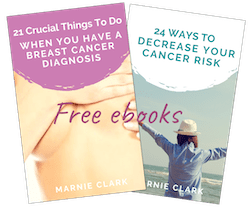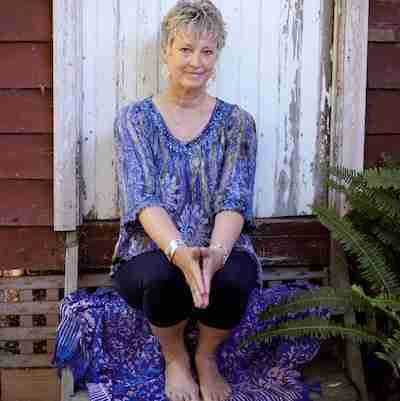Herbal Medicine for Breast Cancer – Passionflower

Subscribe to be notified when new articles are published. You’ll also receive my 2 free ebooks to assist you on your journey.
My subscribers also get a treasure trove of info on nutrition, supplements and lifestyle tips on surviving breast cancer.
Herbal Medicine for Breast Cancer – Passionflower
Passionflower (Passiflora incarnata L.) is a perennial wildflower that grows on a vine. There are currently over 600 species of passionflower described. In this article, I’ll share with you some of the benefits passionflower may have for those with breast cancer, and for survivors.
In European traditional herbal medicine passionflower is used for the treatment of insomnia and anxiety. In North and South America, passionflower is used as a natural sedative – it has a lovely calming influence on the nervous system. It is also used for relief of pain, depression and anxiety, to help lower blood pressure, as an antispasmodic, and for asthma. The flowers, roots, berries and leaves are all used in infusions, teas, liquid extracts and tinctures.
The Science Behind Passionflower
Over 800 research studies exist on passionflower. However, modern researchers are just beginning to understand the pharmacology of passionflower. There are few clinical trials, but having said that, this is what we do know:
Depression, Anxiety
Recent studies have found that one of the things passionflower does is to modulate GABA receptors in the brain, which are involved in both depression and anxiety. [1] [2]
Indole alkaloids present in passionflower also work to boost crucial neurotransmitters in the brain including serotonin, dopamine and noradrenaline by blocking the production of an enzyme known as monoamine oxidase. This is precisely how anti-depressant medications work. We have several studies that show passionflower may reduce the incidence of depression (a common problem for women with breast cancer). [1] [2] [3]
One study on passionflower and anxiety found that the effects of passionflower was comparable to that of the anti-anxiety drug diazepam. [4]
Passionflower and Breast Cancer
For breast cancer survivors, preliminary studies (keep in mind these are not clinical trials) have found that it has these beneficial properties:
* acts as a natural aromatase inhibitor [5] [6]
* has antioxidative and anti-inflammatory properties [6]
* contains apigenin which has been shown in many studies to inhibit the growth of breast cancer cells [6]
* inhibits the invasiveness of a tumor and its ability to spread by inhibiting MMP-2 and MMP-9, enzymes that are used by a developing tumor [6]
* inhibits a protein known as BCRP (breast cancer resistance protein) which researchers discovered in 1998 conferred resistance to chemotherapeutic drugs [7]
* promotes apoptosis (planned cell death, a process absent in cancer cells) in estrogen receptor positive breast cancer cells [8]
* may even help with hot flashes. A 2016 review of medical studies [9] on various herbal medicines including anise, black cohosh, chaste tree, licorice, red clover, evening primrose, flaxseed, valerian, St John’s wort, soy and passionflower had interesting findings. The review concluded that all of these, including passionflower, may alleviate hot flashes for both pre-menopausal and menopausal women.
Safety of Passionflower
Passionflower is generally regarded to be a safe herb, with few reported serious side effects. Rapid heart beat, nausea, and vomiting have been reported. When side effects are experienced, the products being utilized have rarely been tested for contamination, which may have been a contributing factor so make sure to buy organic products. Side effects may also include drowsiness and feelings of being less alert, so people taking passionflower should not drive after taking it, nor operate heavy machinery.
Avoid taking passionflower:
* if you are taking benzodiazepines or barbiturates such as Ativan® or Valium® or Nembutal – passionflower may increase the effects of these medications
* if you are already on anti-anxiety or antidepressant medications
* if you are taking drugs that prolong the QT interval such as azithromycin, dasatinib, fingolimod. The QT interval indicates the electrical activity in the heart’s ventricles. Because lab analyses suggest passionflower may prolong QT interval with large doses, it is not known whether passionflower may have added cardiac effects if used with these medications.
Dosages: Always consult a qualified herbal medicine practitioner for the correct dosage for you.
References:
[1] Modulation of the gamma-aminobutyric acid (GABA) system by Passiflora incarnata L – https://pubmed.ncbi.nlm.nih.gov/21089181/
[2] Dietary supplements used in the treatment of depression, anxiety, and sleep disorders – https://pubmed.ncbi.nlm.nih.gov/10711131/
[3] Herbal Medicine for Depression and Anxiety: A Systematic Review with Assessment of Potential Psycho-Oncologic Relevance – https://www.ncbi.nlm.nih.gov/pmc/articles/PMC5938102/
[4] Anxiolytic activity of a phytochemically characterized Passiflora incarnata extract is mediated via the GABAergic system – https://pubmed.ncbi.nlm.nih.gov/19006051/
[5] Drug/substance reversal effects of a novel tri-substituted benzoflavone moiety (BZF) isolated from Passiflora incarnata Linn.–a brief perspective – https://onlinelibrary.wiley.com/doi/abs/10.1080/13556210310001646385
[6] Pharmacological studies of Passiflora sp. and their bioactive compounds – https://www.doc-developpement-durable.org/file/Culture/Arbres-Fruitiers/FICHES_ARBRES/Barbadine/Pharmacological%20studies%20of%20Passiflora%20sp.pdf
[7] Inhibitory effects of herbal extracts on breast cancer resistance protein (BCRP) and structure-inhibitory potency relationship of isoflavonoids – https://pubmed.ncbi.nlm.nih.gov/20460823/
[8] Chimaphilin induces apoptosis in human breast cancer MCF-7 cells through a ROS-mediated mitochondrial pathway – https://www.sciencedirect.com/science/article/abs/pii/S0278691514001963
[9] The efficacy of Iranian herbal medicines in alleviating hot flashes: A systematic review – https://www.ncbi.nlm.nih.gov/pmc/articles/PMC4899762/
About Marnie Clark
Hi I’m Marnie Clark, breast cancer survivor turned coach. I have 20 years of experience in natural medicine. In 2004/05 I battled breast cancer myself. You can see more about my journey on my page Breast Cancer Diary.
I’ve been healthy and recurrence-free since 2004 and in 2012 I became a Breast Cancer Coach because I became aware of the fact that whilst there is now a wealth of information on the Internet, much of it is confusing, conflicting, and sometimes just wrong!
So it is my duty to help you unconfuse and untangle all that information, and find what works for YOU.
GET MY BEST TIPS on healthy ways to beat breast cancer and prevent recurrences by signing up for my free e-newsletters and eBooks.
You can also “like” me on Facebook (Marnie Clark, Breast Health Coach) to get my inspirational snippets, news and updates. I promise to do my utmost to keep you informed and empowered on your healing journey… and beyond.
Subscribe For Extra Support
Welcome to the Marnie Clark Breast Care Community. When you join my virtual family you will receive my informative newsletter PLUS my gift to you, these 2 eBooks valued at $47 to empower and support you on your breast cancer journey.
My subscribers also get a treasure trove of info on nutrition, supplements and lifestyle tips on surviving breast cancer.
“Thank you for the email and the meaningful words. I also wanted to thank you for being with me during my treatments. Your emails and posts not only gave me information but lots of courage.” Susan Z, Canada




0 Comments